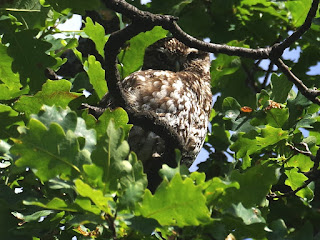The Little Owl basked in the oak tree near the Albert Memorial.
A Reed Warbler ventured out of the reed bed east of the Lido.
A family of Blue Tits bustled around a dead tree near the Henry Moore sculpture. Probably their nest is under a flake of peeling bark on the trunk.
A Great Crested Grebe fished quietly in the Serpentine.
The Coot family in the Long Water under the parapet of the Italian Garden were busy among the water weed. The half grown chick in the foreground is one of their first brood. You can hear the fountains of the Italian Garden.
One of the adults surfaced covered with water weed.
A Mallard near the bridge has three new ducklings.
The Egyptian Geese with seven goslings are keeping them safely near the railings of the small boathouse.
But the pair at the Lido who originally had fourteen are now down to nine.
This Canada Goose with a speckled head comes to the Serpentine yearly to moult.
I'd always vaguely supposed that fish were like motorbikes, with no reverse gear. But I was wrong.
A Black-Tailed Skimmer dragonfly perched on a twig beside the Serpentine. The blue dusting on its abdomen has mostly worn away. This coating is called pruination, from pruina, Latin for hoarfrost.
This female Blue-Tailed Damselfly has a pink thorax. This form is called rufescens, Latin for 'becoming reddish'. End of today's Latin lesson.
Long grass in Kensington Gardens waved in the breeze. The fluffy flower heads that give the field a purple-brown tint belong to Common Bent.
In the Rose Garden, a man was being painted to make him blend into the bench he was sitting on.
This curious pastime must be a tribute to the Chinese artist Liu Bolin, a master of invisibility -- see this picture.














Always something intriguing going on in the Park. And something new, as is the case of a fish going in reverse!
ReplyDeleteI love listening to the sound of the fountains in the Italian Garden. I could listen for hours. As lovely as the tall grass waving in the wind. What have we humans done to deserve so much beauty in the world?
Probably fish have been reversing since the Devonian period. I'd just never seen it before.
Delete